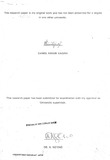| dc.description.abstract | The real exchange rate (RER) plays a central role in the profitability of tradables, which include the agricultural exports. In most of the developing economies, agriculture has a larger tradable component than other sectors.The RER provides a long term signal for resource allocation among the different -sectors of the economy and is therefore likely to affect'' their cperf O'rmance. This study is an attempt to establish the part played by real exchange rate of the Shilling on the performance of agricultural exports in Kenya.lt explains how the real exchange rate of the Shilling influences the performance of agricultural exports through its effect on the price incentive structure.
The study presents a methodology which can be used to
measure effects of real exchange rate on agricultural exports.
*
The study focused on the impact of RER on agricultural export prices relative to prices of non-traded home goods, non- agricultural products and the local food. This study investigated whether there is a relationship between real exchange rate movements and implicit agricultural export tax, agricultural export prices relative to prices of non-traded home goods, non- agricultural products and local food during 1970-90.This study also investigated the link between the RER movements and foreign incomes, weather, real agricultural exports and individual export commodities such as coffee and tea.In this study the equations estimated were recursive and hence Ordinary Least Squares (OLS) was the most appropriate method of estimation.
The findings of the study indicate that the real exchange rate depreciated in real terms during the study period 1970- 90.The results also indicate that the real exchange rate exerts an independent statistical influence on most of the relative prices considered in the study.The results further indicate that real exchange rate exerts an independent statistical influence on the domestic prices of the individual traditional export
li
commodities. In addition, the study established that agricultural export taxes influence the performance of agricultural exports.The study concludes that agricultural exports in general are responsive to changes in RER.The study established that real depreciation of the exchange rate of the Shilling was associated with improvement of the agricultural export prices in 1970s.There was also an increase in real agricultural exports and volumes of tea and coffee in the same period.
The study however could not solely attribute the poor performance of agricultural exports in the 1980s to changes in real exchange rate of the Shilling.During this period the real exchange rate exhibited an upward trend (ie depreciated in real terms) while the real agricultural exports had a downward trend.Therefore the study concludes that, RER partly explains the performance of agricultural exports.The RER is also a partial indicator of the competitiveness of the agricultural exports sector.
Various policy implications are drawn from, the results of the study. The study recommends real exchange rate as one of the critical variables that needs to be monitored by policy makers.The aim should be to maintain the RER at a level that can encourage agricultural exports sector and economic growth.The study also recommends a low tax policy on agricultural exports to induce the farmers (producers) to put more effort on agricultural exports. | en_US |

